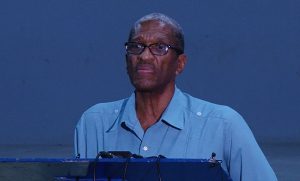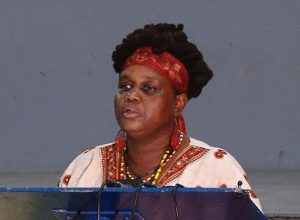By Bibi Khatoon
As the Regional Commission on Marijuana meets with local interest groups on the issues surrounding Marijuana use in the Caribbean, a former University of Guyana Lecturer, Jermaine Grant pointed out that it is not the substance which destroys lives but the “criminalization of the substance.”
He was indirectly responding to Assistant Secretary General of CARICOM, Douglas Slater, who during his remarks explained that the Heads of Government were initially looking at the economic possibilities of exploiting the substance. However, he said they later “realized that many young people, the lives of many young people have been destroyed from getting involved, even small quantities—the use of small quantities of marijuana, they can get a criminal record which can mean the end of their lives.”

But Grant compared the mandated three-year prison sentence for possession of cannabis to other offences, including robbery, which are sometimes given a shorter jail sentence in Guyana. As such, he highlighted that it is the criminalization of marijuana which causes the lives of young people to be destroyed.
“I believe the criminalization of marijuana in Guyana and the Caribbean has played a role in the criminalization of Caribbean people, especially young people found with small quantities…the possession of marijuana which is a non-violent offence guarantees jail time while violent offences such as robbery under arms provide judicial officers with the flexibility to impose fines, imprisonment or non-imprisonment,” he outlined, as he described the current law as draconian.
Supporting his argument was Social Worker, Nicole Cole, who related that she recently visited the New Amsterdam Prison and found that the oldest person at the facility is a 77-year-old woman who was imprisoned for possession of a few grams of marijuana. Cole linked the case to poverty, noting that it was the failure to pay the requested bail that saw the woman remaining in prison.

Outlining a number of strategies that she would like to be implemented, Cole asked that the laws of Guyana be changed moving the current limit to 56 grams. She also asked that a minimum fine of $1000 be placed on illegal possession, and there must be exemptions for the Rastafarian community to which she belongs and other persons who require the substance for medicinal purposes. She also called for the establishment of a rehabilitation fund.
The public meeting, hosted at the St Stanislaus College, Brickdam, Georgetown, was attended by the majority of persons who are either lobbying for the decriminalisation, legalisation or regularisation of the substance in various quantities and for various purposes.
Ras Leon Saul, who created the Healing of the Nation Theocracy political party prior to the 2015 General and Regional Elections to lobby for the legalization of marijuana, said while his group is firm on legalization, it is open to the decriminalization of the substance.

Another contributor, Dr Turhane Doerga spoke of the way in which the product is being used for economic benefits in other countries. Also present at the event was Alliance For Change (AFC) Member of Parliament, Michael Carrington in whose name the Narcotics Drug and Psychotropic Substances (Control) (Amendment) Bill was tabled in December 2015, but has not been acted on because the Partnership for National Unity (APNU) had some concerns.
Chair of the Marijuana Commission, Professor Rosemarie Belle-Antoine disclosed that other meetings were hosted on Monday with other focus groups.
She noted that while the issue is complex and has several dimensions, it is important to take the views of everyone onboard. The Professor also emphasized the need for a regional approach to the issue and criticized Jamaica for reducing the possession of small amounts to a petty offense without the input of other CARICOM countries. She said Jamaica is “already facing issues going ahead alone.”

The Regional Commission on Marijuana was established following a decision taken at 25th Inter-Sessional Meeting of CARICOM Heads of Government in March 2014 in St. Vincent and the Grenadines. It is composed of practitioners with expert knowledge in a variety of disciplines including medicine and allied health, health research, law enforcement, ethics, education, anthropology/sociology/ culture.





